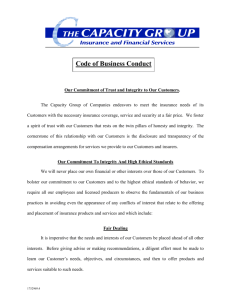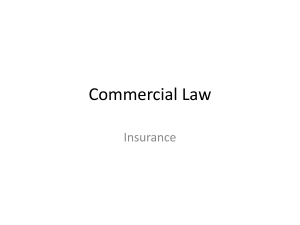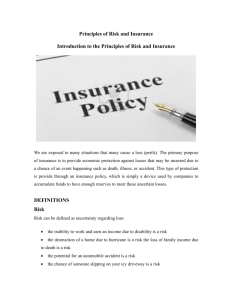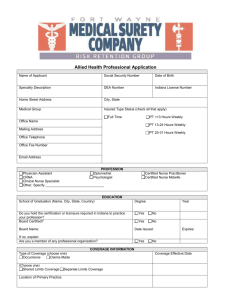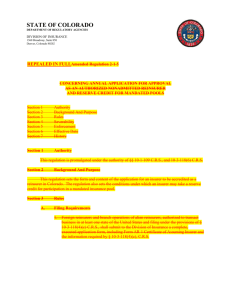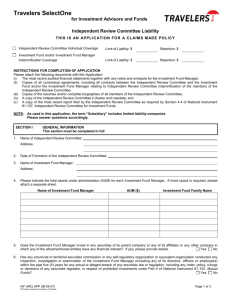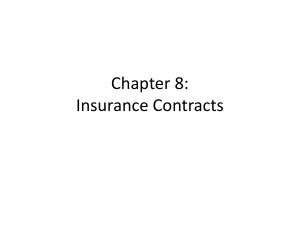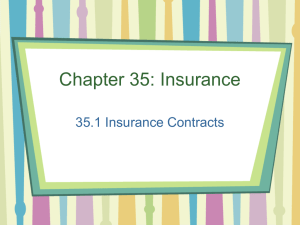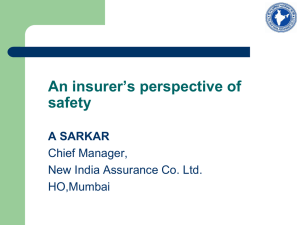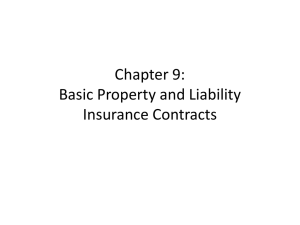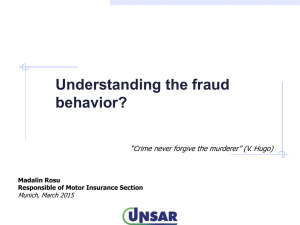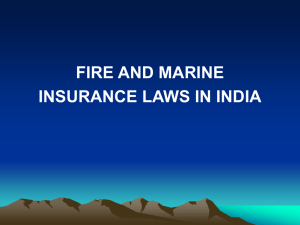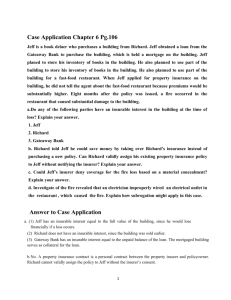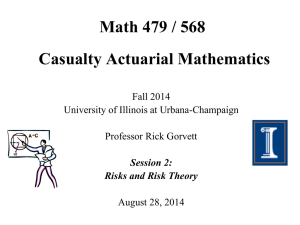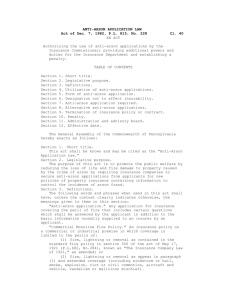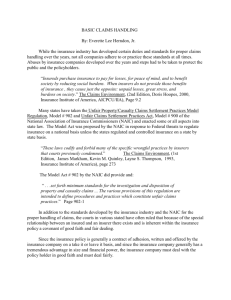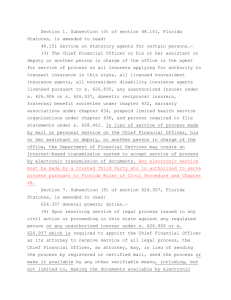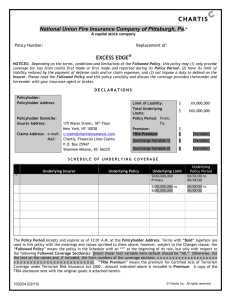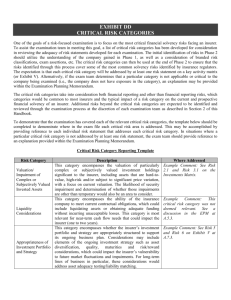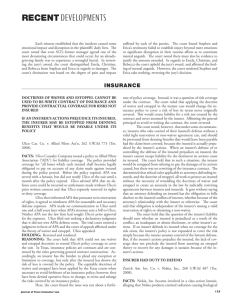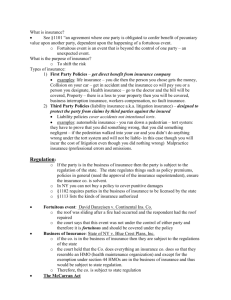Conn v Westminster Motor Insurance Association Ltd
advertisement
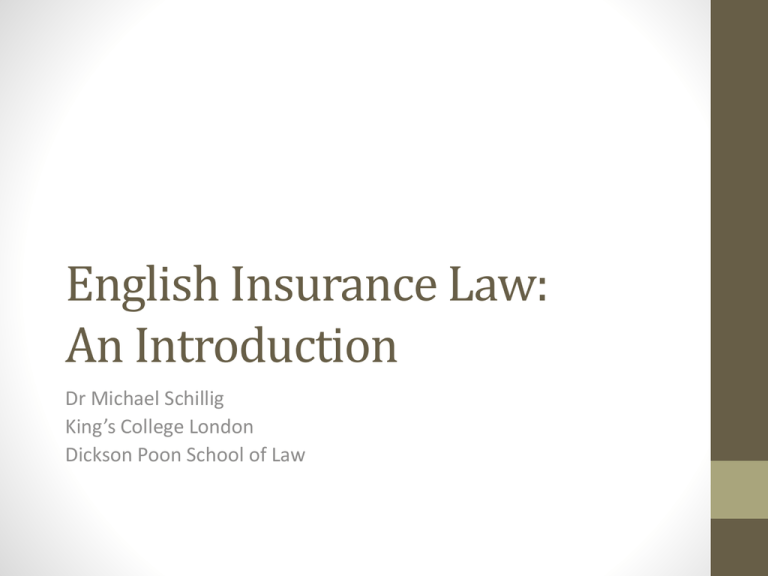
English Insurance Law: An Introduction Dr Michael Schillig King’s College London Dickson Poon School of Law Overview • Nature and types of insurance • Insurable interest • Insurance as a contract uberrimae fidei • Content and interpretation • Liability and rights of the insurer Nature and types of insurance • Indemnity insurance • Insurer undertakes to provide the insured with an indemnity against a possible future loss or liability • Property insurance • Liability insurance • Contingency insurance • Insurer undertakes to pay a specified sum on the happening of a named event • Life insurance • Personal injury policy Insurable interest: life insurance • Life assured does not have to show an interest in his own life • Interest is presumed in case of a spouse or civil partner • Dalby v India and London Life Assurance Co (1854) 15 CB 365 • Claimant insured the life of the Duke of Cambridge • Reinsured with the defendant • Initial insurance was cancelled, claimant continued to pay reinsurance premium until the death of the Duke • Claimant had an interest at the time of taking out the policy; he did not have to show an interest at the time of the loss • Generally, some pecuniary interest in the life assured • Creditor may insure the life of a debtor up to the mount of the debt Insurable interest: property • Lucena v Craufurd (1806) 2 B&PNR 269 • Captured enemy ships were insured when still on high sea • Some ships were lost before they reached British ports • Crown commissioners could take charge only after ships reached British ports, prior to that no insurable interest • Mere expectancy is insufficient • Macaura v Northern Assurance Co ltd [1925] AC 619 • Sole shareholder has no insurable interest in the assets of his company • Hepburn v ATomlinson (Hauliers) Ltd [1966] AC 451 • Carriers with insurable interest of the full value of the goods in transit • Not just their potential liabilities to the owners Contract uberimae fidei • Carter v Boehm (1766) 3 Burr 1905 • ‘Good faith forbids either party, by concealing what he privately knows, to draw the other into a bargain from the ignorance of the fact, and his believing the contrary.’ • Woolcott v Sun Alliance and London Insurance Ltd [1978] 1 WLR 493 • Fire insurance: insurer refused payment because insured had not disclosed that he had been convicted of robbery some 12 years previously • Was not asked explicitly • Duty to disclose such facts as a reasonable or prudent insurer might have treated as material • Criminal record self-evident Contract uberimae fidei • Economides v Commercial Union Insurance plc [1998] QB 587 • • • • Household insurance Obligation to be honest Insured’s belief, if made in good faith, to be deemed to be honest No obligation to make inquiries (expert valuation etc of items) • Dawsons Ltd v Bonnin [1922] 2 AC 413 • • • • • Insurance of a lorry: proposal should be the ‘basis’ of the contract According to proposal, lorry normally garaged in Glasgow Actually, normally garage at farm outside Glasgow Although misstatement was not ‘material’ ‘Basis of the contract’ argument allowed insurers to avoid liability Content and interpretation • Conn v Westminster Motor Insurance Association Ltd [1966] 1 Lloyd’s Rep 407 • Insurance of a taxi • ‘To take reasonable steps to maintain the vehicle in an efficient condition’ • Taxi was damaged in an accident because driver was asleep • Rundown state did not contribute to the accident • Insurer could avoid liability • Warranty: no liability regardless of contribution • Defining of the risk covered: breach must be causally connected to the loss; otherwise insurer will remain liable Content and interpretation • Farr v Motor Trader’s Mutual Insurance Society [1920] 3 KB 669 • Two taxis; each to be driven in one shift only per 24h • For two days, one taxi was driven for two shifts per 24h whilst the other one was being repaired • Later, when one shift per 24h had been resumed, insurer refused payment for breach of warranty • Construction of the contract: mere definition of the risk • Therefore, insurer was liable Liability and rights of insurer • Raynor v Preston (1881) 18 Ch D 1 • P to sell property to R • After contract and prior to conveyance, property destroyed by fire • Risk on buyer (R), therefore payment of price in full • P was paid by insurers, R had no right to insurance money • Castellain v Preston (1883) 11 QB 380 • Since P had sustained no loss, he had to repay the money to the insurers • The assured shall be fully indemnified, but shall never be more than fully indemnified. • ‘That is the fundamental principle of insurance’. Rights of insurer • Salvage • Where insurer has compensated the insured for total loss of the insured property, all rights to the property are ceded by operation of law to the insurer, who thereby becomes the owner. • Subrogation • An insured cannot ever receive more than a full indemnity for his loss, if he does receive more he is accountable to the insurer for it. • Insurer who has indemnified assured is entitled to succeed to all the rights of the latter – ‘to stand in his shoes’ • Contribution • More than one policy covering the same risk; insurer who has met the claim in full is entitled to contribution on ratable basis Conclusion • Parts of insurance law are codified: • eg Life Assurance Act 1774 • eg Marine Insurance Act 1906 • Common law • Significant modifications of general contract law principles • Most of the principles first fleshed out in the context of marine insurance

